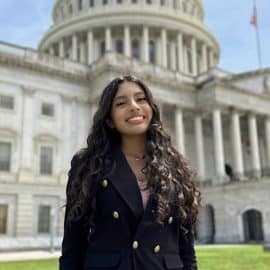


| Personal Brand Presence | 7 / 10 |
| Authoritativeness | 6 / 10 |
| Expertise | 7 / 10 |
| Influence | 5 / 10 |
| Overall Rating | 6 / 10 |
In addition to being the founder and president of Encode Justice, a worldwide organization dedicated to advancing racial, social, and economic justice in the era of artificial intelligence, Sneha Revanur is a junior at Evergreen Valley High School in San Jose, California.
Hundreds of students in more than 20 nations and 30 US states have joined forces with Sneha to fight for an egalitarian future in technology. Encode Justice’s policy, lobbying, education, and research projects, which have their origins in local organizing, have already had noticeable results.
California Proposition 25, which would have required the use of racially biased risk assessment algorithms, was successfully rejected by their first initiative. The government’s use of face recognition technology, which disproportionately misidentifies persons of color and has led to the unjustified detention of Black males, is being resisted by Encode Justice. In addition to overseeing an AI ethics workshop program that reached 3,000+ high school students—many of whom were Black, Brown, and low-income—Sneha’s has helped introduce a surveillance ordinance in San Jose, directly contributed to the passing of a facial recognition ban in Minneapolis, and trained Encode Justice’s youth lobbyists, who have met with more than 50 local, state, and federal lawmakers.
Revanur contributed to the writing of the Youth Open Letter on AI Risks, in which Encode Justice and nine other youth organizations demanded specific regulatory actions and argued for the involvement of young voices in AI legislation. The letter also recognizes the “increasing tension”—as Revanur puts it—between the hazards associated with AI now and in the future. Politico referred to Revanur as “the Greta Thunberg of AI” following the letter’s release in recognition of her advocacy for lawmakers to amend laws.
Revanur emphasized the significance of youth involvement in AI regulation and policy formation. “Those who are very old, very disconnected from technology, and who did not grow up in a generation where machines were at their fingertips dominate Congress,” the speaker remarked. She cited instances of elderly MPs being ill-informed about social media and artificial intelligence (AI), such as when Mark Zuckerberg was strangely questioned during a congressional hearing. “We have younger voices pressing on leadership to actually take action on issues that are genuinely of concern to us, and I think that’s really important,” Revanur stated. “If not, we’ll see the leadership continue to completely ignore these problems.”
Solana has demonstrated strong performance, driven by increasing adoption, institutional interest, and key partnerships, while facing potential ...
Know MoreIn April 2025, the crypto space focused on strengthening core infrastructure, with Ethereum preparing for the Pectra ...
Know More